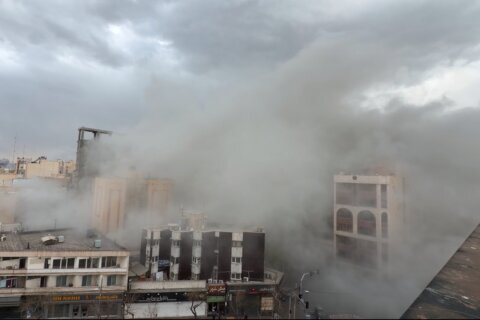As war rages in Ukraine, it’s not clear how much, if any, ground truth Russian President Vladimir Putin is getting.
According to recently declassified intelligence, a culture of fear, mistrust and lying dominate communications between him and trusted advisers.
“We have information that Putin felt misled by the Russian military,” a U.S. official said in a statement to WTOP, quoting intelligence released on Wednesday.
As a part of its strategy to foil Russia’s attempts to invade and decapitate Ukraine’s leadership, the U.S. has been declassifying intelligence it’s collected for more than a month.
The latest release strikes a severe blow at the very heart of Putin’s war.
“There is now persistent tension between Putin and the MOD (Ministry of Defense), stemming from Putin’s mistrust in MOD leadership,” the statement said.
The MOD is led by Gen. Sergei Shoigu, one of Putin’s oldest and ostensibly most-trusted advisers. He mysteriously disappeared from public view for two weeks, resurfacing on Saturday, sparking global speculation that his disappearance was due to disciplinary action.
The official said in the statement, “Putin didn’t even know his military was using and losing conscripts in Ukraine, showing a clear breakdown in the flow of accurate information to the Russian President.”
The war in Ukraine revealed catastrophic miscalculations by the Russian government, namely the widely publicized view that the invasion would be over three days after it started on Feb. 24.
Ironically, Russian Lt. Gen. Yakov Rezantsev, who made that prediction, was killed on Friday by Ukrainian forces. He was the seventh general killed in less than a month of fighting. By comparison, the U.S. military lost one general officer in combat during 20 years of fighting in Afghanistan and Iraq.
Eight Russian colonels are believed to have been killed as well in recent weeks.
Ukraine’s Ministry of Defense says in total, more than 17,000 Russian troops have been killed within that one-month time frame. NATO estimates between 7,000 and 15,000 have been killed.
Reductions in troops
During peace negotiations on Tuesday, Moscow indicated it would “dramatically reduce” the number of forces near Ukraine’s capital of Kyiv, which number in the tens of thousands.
Pentagon spokesman John Kirby said during a briefing on Wednesday that “they are beginning to reposition some of those troops into Belarus.”
It’s not clear why, but massive equipment losses and the inability to communicate securely may have played a role in that decision.
According to the intelligence released by the U.S. official, the misrepresentations extend well beyond the war on the ground in Ukraine and into other critical components of Russia.
“We believe that Putin is being misinformed by his advisors about how badly the Russian military is performing; and how the Russian economy is being crippled by sanctions,” the official said in the statement.
The motivation for all the misinformation, the official said, is “because his senior advisors are too afraid to tell him the truth.”
According to Eeva Eek Pajuste, director of Estonia’s Lennart Meri Security Conference, this is a dangerous development, because Putin’s flawed view of Ukraine’s military capabilities and Western resolve to stop the invasion was supported by this misinformation.
Given Putin’s unpredictable mental state, his nuclear threats and his actions in Ukraine, the threat to the rest of Europe is amplified by keeping him in the dark.
“The overall security situation in all of Europe has been aggravated,” Eek Pajuste said.
Estonia, Lithuania and Latvia are relatively small countries that border either Russia or Russia’s de facto satellite state Belarus.
“The borderline of direct military threat,” Eek-Pajuste said, “runs along NATO borders. Even in this situation of unpredictability, it is possible to see that Putin wants to avoid a direct war with NATO.”
But if Putin is being misinformed about everything from the strength of the ruble to military readiness, there is a chance that other miscalculations with far greater costs could take place.
READ MORE: Economic sanctions undergo scrutiny after the Russian ruble rebounds
“We can’t exclude anything, should Putin find and feel himself cornered and ready for desperate steps. It is a battle for his life and death, and in this battle, reason is not the main weapon,” Eek-Pajuste said.
“The threat for the Eastern flank,” she said, “is not only Russia’s military, but there is an environmental threat, from a possible major nuclear incident in Ukrainian territory.”








